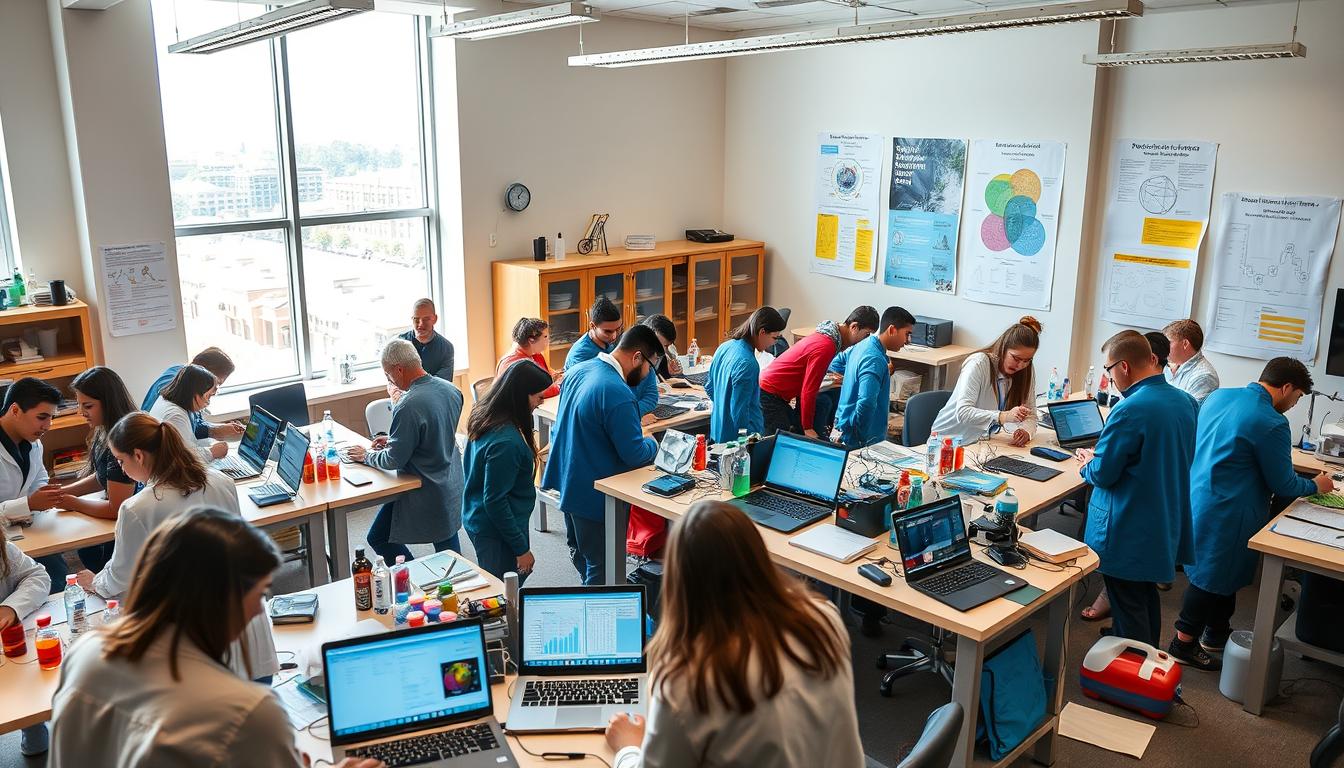Table of Contents
ToggleResearch opportunities are key for students’ growth and development. They offer many benefits that improve their learning and prepare them for the future.
Doing research helps students think critically and solve problems. They dive deep into complex topics and understand them better. This way, they learn to analyze data, interpret findings, and share their ideas well. These skills are important in both work and school.
Research also keeps students up-to-date with the latest in their field. This knowledge boosts their credibility and helps them make better decisions. It leads to better grades and success in school.
Key Takeaways
- Research opportunities greatly impact students’ growth and development, serving as a resource for effective learning and open career opportunities.
- Engaging in research helps students develop critical thinking and problem-solving skills, as well as data analysis and scientific communication abilities.
- Research exposure keeps students informed about current events and trends, increasing their credibility and aiding in better comprehension and decision-making.
- Undergraduate research experiences contribute to academic success, including improved grade point averages and preparedness for graduate study.
- Participation in research is a robust predictor of gains in knowledge, skills, institutional support, and student-faculty interactions.
Understanding the Impact of Academic Research
Academic research goes beyond university walls. It shapes U.S. education, knowledge, and innovation. This deep dive explores its scale, significance, and trends in the U.S.
The Scale of Academic Research in U.S. Education
In fiscal year 2021, U.S. colleges and universities spent nearly $90 billion on research. The government funded 55% of this. Academic institutions did 44% of the nation’s basic research, making up 11% of total R&D investment.
Also Read : How Can A Travel Medical Assistant Support Healthcare Facilities In Different Locations?
The U.S. led in total R&D funding among 32 countries. But it ranked 23rd in R&D spending as a share of GDP.
Role in Knowledge Discovery and Innovation
Academic research drives knowledge and innovation. In 2021, research facilities covered 236.1 million square feet. Institutions plan to spend $12.8 billion on new facilities from 2022 to 2023.
Current Research Investment Trends
U.S. academic research investment is changing. There’s a push to show how research impacts society and the economy. This shift highlights research’s role in the nation’s growth and success.
Also Read : How Does Remote Work Part Time Impact Work-Life Balance?
Research Opportunities and Career Development

Getting involved in research during your studies can change your life. It opens doors to new fields and teaches you valuable skills. These skills are needed in both school and the workplace.
Research helps you think critically and solve problems. You learn to look at challenges from different sides. This skill is important because it shows you can handle tough issues.
Research also gets you ready for graduate school and research careers. It lets you dive deep into your interests. You also meet professors who can help with your graduate school applications.
Everyone values research skills and career development. Big companies look for people who can solve problems with research. They want those who can think critically.
- Explore different research areas that match your interests.
- Learn important skills like data analysis and writing through research.
- Get help and connections by working with professors on projects.
- Show your skills and experience to improve your graduate school and research careers.
By taking on research, you open up many opportunities for growth. Invest in your career development and see how research can change your life.
Also Read : Unlock Opportunities With PSU Exams Jobs
Building Essential Academic Skills Through Research

Research is a key experience that boosts critical thinking, problem-solving, and more. It sparks curiosity, letting students discover new things and grow their knowledge.
Critical Thinking and Problem-Solving Development
Research projects make students think deeply about information. They learn to spot patterns and make smart choices. This sharpens their critical thinking, helping them solve problems creatively.
Data Analysis and Interpretation Skills
Research teaches students to work with numbers and figures. They learn to collect, sort, and understand data. This skill is crucial for both school and work.
Also Read : Embrace Growth With Lifelong Learning Opportunities
Scientific Writing and Communication
Writing and reading are key parts of research, expanding knowledge and improving how we express ourselves. Students learn to write clear reports and share their findings well. These skills are highly valued in many areas.
“Engaging in research is a transformative experience that develops critical thinking, problem-solving, data analysis, scientific writing, and communication skills.”
Research-driven learning prepares students for big challenges. It teaches them to think deeply and communicate well. These skills are essential for success in school and beyond.
Also Read : Exploring The Evolution Of The Educational System In The Usa
Research Opportunities in Higher Education
In the United States, a few top universities lead in academic research. Just 131 universities are at the forefront, making up nearly 75% of all U.S. academic R&D spending in 2021. These schools have about 80% of science and engineering doctoral students and over 80% of postdoctoral researchers.
Public universities are key in research, with 65% of R&D spending. Private universities have 35%. Also, universities with medical schools do 75% of all federally supported research in 2021.
| Institution Type | Share of Academic R&D Spending |
|---|---|
| Public Universities | 65% |
| Private Universities | 35% |
| Universities with Medical Schools | 75% |
These top universities offer many chances for students to work on new research projects. They get to work with famous faculty mentors. These places have programs for undergrads and research-focused courses, creating a lively space for learning and discovery.
These leading research universities are at the heart of U.S. academic R&D. They are set to greatly influence the future of knowledge, innovation, and progress in society.
The Role of Federal Funding in Academic Research
The federal government is key in supporting research in the U.S. In 2021, it funded almost 55% of the $90 billion spent on research and development at colleges and universities. This shows the government’s dedication to scientific progress and innovation through research.
Major Funding Agencies and Programs
There are six main agencies that fund most of the research: the Department of Health and Human Services, the Department of Defense, the National Science Foundation, the Department of Energy, NASA, and the USDA. These agencies offer grants and funding for universities to do groundbreaking research in many fields.
Distribution of Research Funds
Not all colleges get the same amount of funding. In 2021, 131 top research institutions got about 75% of the R&D spending. Public universities made up 65% of this total. Also, Historically Black Colleges and Universities (HBCUs) saw a 35% drop in federal R&D funding from 2012 to 2021, when adjusted for inflation.
Support for Underrepresented Groups
The government also focuses on diversity in research. The number of underrepresented minorities in science and engineering doctoral programs went up from 7% in 2006 to 10% in 2021. The number of women in these programs also increased, from about 78,700 in 2003 to around 140,800 in 2021. These numbers show the government’s effort to make research more diverse.
Federal funding is crucial for research, supporting important discoveries and promoting diversity. By understanding how federal agencies distribute funds and support underrepresented groups, we see the big impact of government investment on science and academia.
Benefits of Undergraduate Research Experience

Getting involved in undergraduate research changes your academic and career path. It’s a chance to dive into research projects and learn by doing. You’ll improve your critical thinking, problem-solving, and research skills.
Research shows that undergraduate research helps students stay in school longer. It also makes them more interested in going to graduate school. Alumni who did research experiences for undergraduates (REUs) or summer research programs say it helped them a lot.
Undergraduate research is especially good for students who are underrepresented. It helps keep them in school and opens up new career paths. It also helps students grow intellectually and personally.
- 70% of undergraduate researchers get closer to their professors. This leads to great mentorship and letters of recommendation.
- 90% of graduate schools look at research experience when deciding who to admit. Without it, getting an interview is tough.
- Employers and graduate schools really value people with real-world research experience. It makes you stand out for jobs and school.
In the end, undergraduate research is key to growing both academically and professionally. It gives you the skills, knowledge, and connections you need to succeed.
“Undergraduate research serves as a catalyst for liberal learning and personal development.”
– David Lopatto, Professor of Psychology
Also Read : How Cameron University Prepares Students For Career Success
Conclusion
Research opportunities are key for growing academically. They help develop critical thinking and problem-solving skills. They also aid in career development and advancing fields.
The U.S. has a strong research landscape, thanks to federal and institutional funding. This prepares students for careers and graduate studies. It also boosts the nation’s scientific and technical workforce.
The role of research in higher education is vital. It shapes the future of academia and industry. By presenting a synthesis of arguments, researchers contribute to growth and knowledge.
Researchers can highlight the importance of their findings in the conclusion. They can also reflect on the evidence and share insights. This makes their work credible and impactful.
By being confident and authoritative, researchers ensure their work’s credibility. This fosts a thriving academic ecosystem. It’s driven by innovation and the pursuit of knowledge.
FAQs
Q: Why are research opportunities important for academic growth?
A: Research opportunities are crucial for academic growth as they allow students to engage deeply with their discipline, develop critical thinking skills, and apply theoretical knowledge in practical settings. They also enhance a student’s resume and provide valuable networking opportunities with faculty and professionals.
Q: What types of research programs are available at universities?
A: Universities offer a variety of research programs, including summer research programs, undergraduate research opportunities, and graduate research positions. These programs often span multiple disciplines such as science, psychology, arts and humanities, and social sciences.
Q: How can I find undergraduate research opportunities on my campus?
A: You can find undergraduate research opportunities by visiting your university’s office of undergraduate research, checking departmental databases, or speaking with faculty members about available projects. Many universities also have dedicated platforms or databases that list current research positions.
Q: What role does a faculty mentor play in research?
A: A faculty mentor provides guidance, support, and expertise to students engaged in research. They help students navigate the research process, develop their skills, and may assist in publishing findings or completing a thesis.
Q: Are summer research programs beneficial for undergraduate students?
A: Yes, summer research programs are highly beneficial for undergraduate students as they provide intensive experiences that can lead to significant academic and professional development. These programs often include stipends and housing, making them accessible to a wider range of students.
Q: How can participating in research enhance my career prospects?
A: Participating in research enhances career prospects by providing practical experience, developing transferable skills, and creating networking opportunities with faculty and industry professionals. It also demonstrates initiative and a commitment to your field, which is attractive to potential employers or graduate schools.
Q: What is the difference between undergraduate and graduate research opportunities?
A: Undergraduate research opportunities are typically designed for students at the bachelor’s level and may focus on introducing research methods and practices. Graduate research opportunities, on the other hand, are more advanced and often involve conducting independent research, contributing to a thesis, or working on specialized projects within a discipline.
Q: How can I get involved in research if I have no prior experience?
A: To get involved in research without prior experience, start by expressing interest to your professors or faculty members. Many are willing to take on eager students, and there are often introductory programs or workshops designed for beginners. Look for opportunities that provide training and support.
Q: What are the advantages of having research experience in the arts and humanities?
A: Research experience in the arts and humanities enhances critical analysis, creativity, and communication skills. It allows students to explore complex ideas and contribute to cultural discussions, and it can be an excellent foundation for careers in education, writing, and public engagement.
Q: Can I conduct research in a laboratory setting as an undergraduate?
A: Yes, many undergraduate research opportunities exist in laboratory settings, particularly in STEM disciplines. These positions typically involve hands-on work in a lab, where students can learn techniques and contribute to ongoing research projects under the supervision of experienced faculty mentors.
Source Links
- https://www.ucdavis.edu/majors/blog/exploring-options/reasons-why-undergraduates-should-do-research
- https://pmc.ncbi.nlm.nih.gov/articles/PMC6309399/
- https://blog.growkudos.com/research-mobilization/research-impact-what-why-how
- https://authorservices.taylorandfrancis.com/research-impact/
- https://www.stcloudstate.edu/biology/research.aspx





